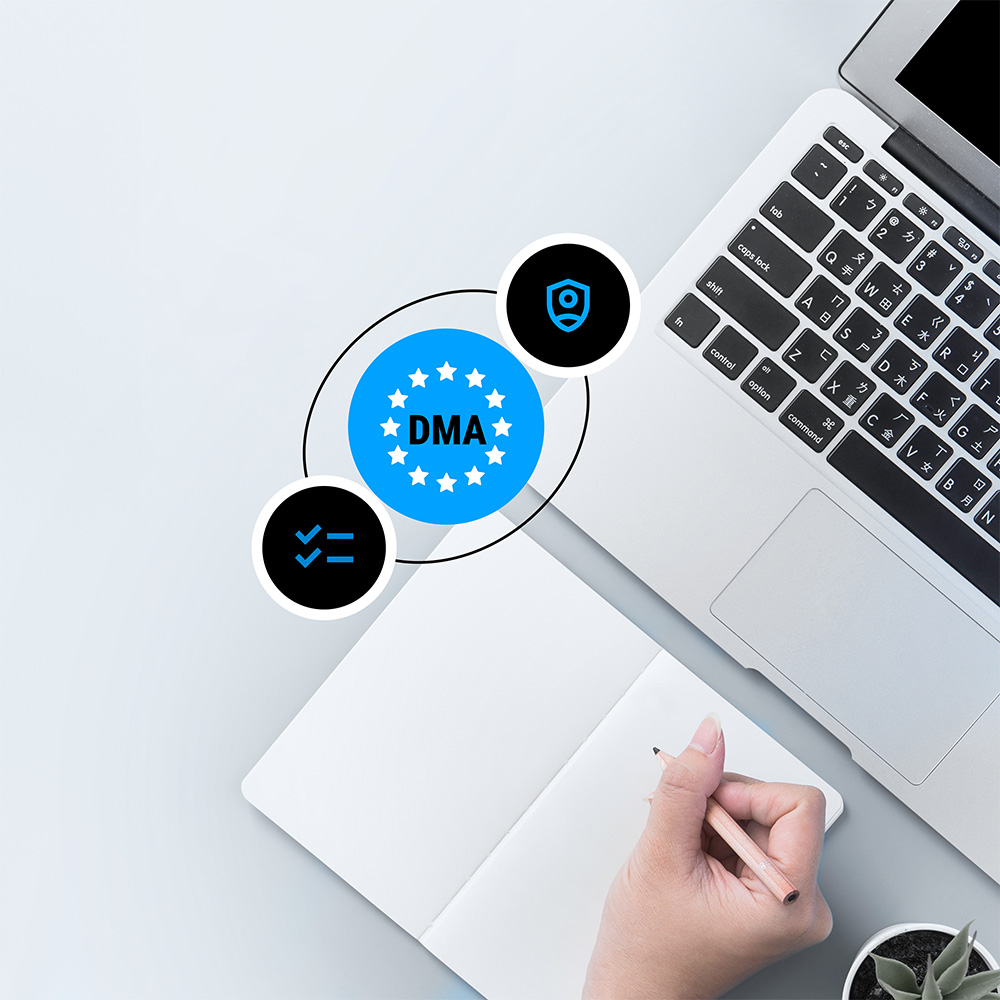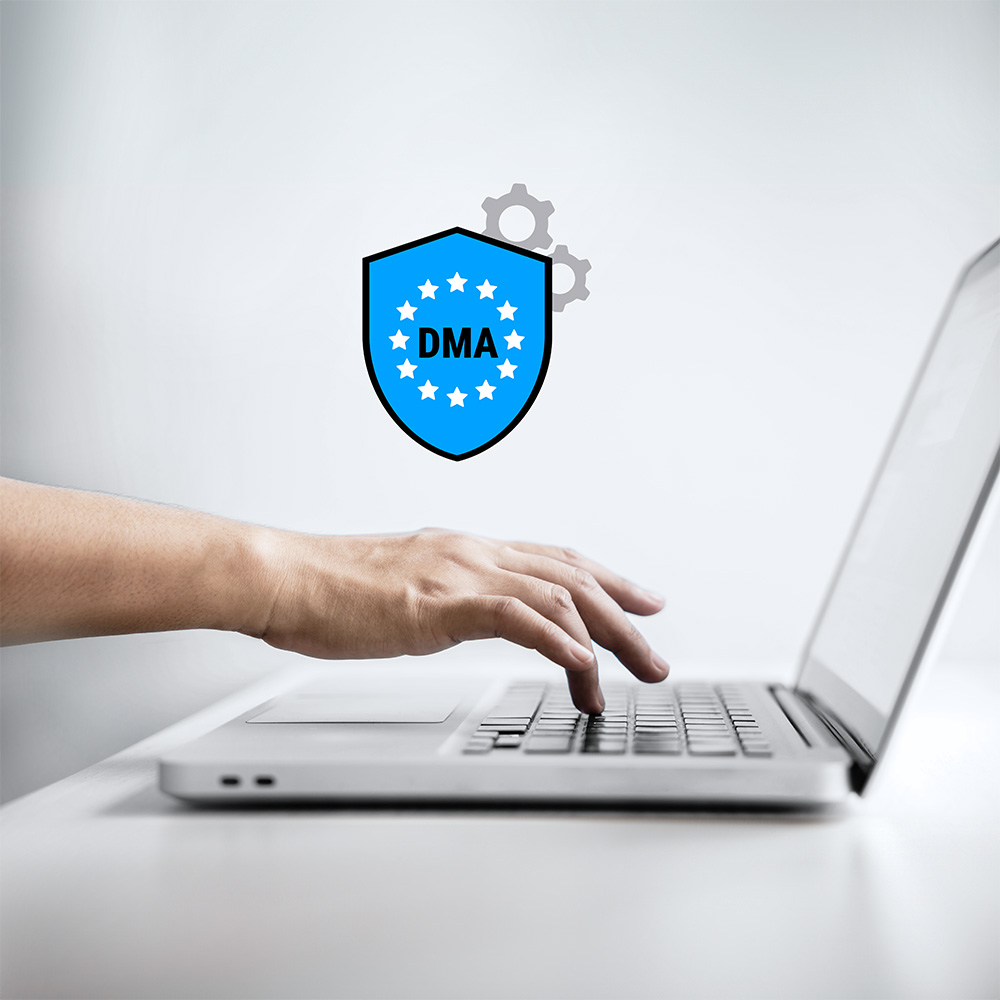Achieve compliance with the European Digital Markets Act (DMA)
What is the Digital Markets Act (DMA)?
The European Union’s Digital Markets Act came into force November 1, 2022. The regulation is meant to protect data privacy and ensure fair competition in digital markets. It designates seven big tech gatekeeper companies and assigns them specific compliance requirements. The first six were required to comply with the DMA as of March 6, 2024. Booking.com, designated in May 2024, had a six-month period from then to achieve compliance. The Digital Markets Act also affects businesses like yours that use the gatekeepers’ platforms and services for sales and marketing purposes.
Common DMA questions and answersVALUING PRIVACY
Consent management pays off
The Digital Markets Act applies to companies operating in the EU and that process the personal data of EU residents.
With the Digital Markets Act, the European Commission has placed specific responsibilities on seven designated gatekeepers to ensure protection of user privacy and fair competitive practices.
Digital Markets Act compliance requires gatekeepers and third-party companies that use their 23 identified core platform services for search, advertising, etc. to obtain explicit consent for collection and use of EU consumers’ personal data.
ACHIEVING COMPLIANCE
Consent management and privacy compliance
Gatekeepers must obtain explicit consent for collection and use of EU residents’ personal data for core platforms services (CPS).
Gatekeepers can require third parties using their platforms and services to be DMA-compliant. This also aligns with GDPR and ePrivacy compliance, which are also required in the EU. For example, by implementing a consent management platform (CMP) to enable compliant consent collection and signaling.
A flexible, reliable and fully customizable CMP like Usercentrics CMP for Web and Apps gets you ready for Digital Markets Act compliance and seamlessly integrates with many CMS platforms, core platform services, and more.
How to install Usercentrics CMP
The Usercentrics Consent Management Platform (CMP) stores, manages and signals valid user consent and privacy preferences.
YOUR QUESTIONS ANSWERED
Contact our expert team
We’re happy to answer questions on Digital Markets Act privacy compliance and get you acquainted with Usercentrics and our Consent Management Platform.
- Doing business in the EU and with the Digital Markets Act’s designated gatekeepers and unsure whether your website or app are compliant with privacy law?
- Not sure how to achieve Digital Markets Act compliance? Get in touch and learn how the Usercentrics Consent Management Platform can help you achieve DMA compliance.
- Looking to partner with us?
New to DMA requirements? We’ve got you covered.
Frequently asked questions
What is the Digital Markets Act (DMA)?
The Digital Markets is a regulation developed by the European Commission that applies to large tech companies operating in the European Union, such as Google and Amazon. The law aims to foster competition and innovation and improve fairness for companies operating in digital markets. The DMA requires increased improvements in transparency, data sharing, and platform interoperability, as well as for consumer choice and data privacy.
Under the DMA seven large, influential tech companies have so far been designated “gatekeepers”. This means they have specific obligations under the law. However, many third-party companies rely on the gatekeepers’ platforms and services, e.g. for advertising, and will also have obligations to ensure compliance, like for data privacy and consent.
When does the Digital Markets Act come into force?
The Digital Markets Act officially came into force November 1, 2022, with most of its rules active by May 2023. The European Commission designated the first six gatekeepers on September 6, 2023, and Booking.com on May 13, 2024. The original gatekeepers had until March 6, 2024 to comply with the Digital Markets Act. Booking.com has until November 13, 2024.
In what region(s) does the Digital Markets Act apply?
The Digital Markets Act applies to gatekeepers and third parties doing business with them that operate in the European Union, European Economic Area and United Kingdom. The law also applies to consumers living in those regions.
What companies does the Digital Markets Act apply to?
The Digital Markets Act applies to companies that own and operate large online digital platforms and services that meet the EC’s criteria, including the size of their user base, significant impact on digital markets, influence over innovation, how they act as intermediaries between businesses and users, and their durable position of power in digital markets. These platforms and services have been designated as “gatekeepers” and will be subject to enhanced regulatory obligations and scrutiny under the DMA.
Which companies have been designated gatekeepers by the European Commission?
The seven gatekeepers designated by the European Commission to date are:
- Alphabet (owner of Google and Android)
- Amazon
- Apple
- Booking.com
- ByteDance (owner of TikTok)
- Meta (owner of Facebook, Instagram, WhatsApp, and others)
- Microsoft
This list is likely to continue grow and change in the future. Although the Digital Markets Act applies directly to these gatekeepers, many businesses work with and rely on their platforms and services. These third parties need to understand the law and its possible applications to their business, e.g. obtaining valid user consent. The gatekeepers will communicate and impose their own requirements of partners and customer companies to ensure Digital Markets Act compliance.
What is the scope of applicability for the Digital Markets Act?
The Digital Markets Act primarily focuses on developing digital markets that are more transparent, more fair to smaller businesses, and more competitive overall. The Act also aims to better protect user privacy and consumer choice.
Overall, the DMA should help smaller players to grow and innovate in digital markets in the EU to compete with the big tech platforms, and prevent the gatekeepers from using their power and reach to control operations and growth of smaller organizations that rely on them.
What are gatekeepers’ core platform services (CPS)?
These sites, software, and services are owned and operated by the gatekeepers, and are integral to digital business operations and online activities for millions of companies and consumers. The CPS include online search engines, operating systems, web browsers, voice assistants, online social networks, video sharing platforms, and more. To date 23 core platform services (CPS) have been identified under the Digital Markets Act, though the list is likely to continue to grow and change over time:
- 6 intermediary platforms (Amazon Marketplace, Google Maps, Google Play, Google Shopping, iOS App Store, Meta Marketplace)
- 4 social networks (Facebook, Instagram, LinkedIn, TikTok)
- 3 online advertising services (Amazon, Google, and Meta)
- 3 most popular operating systems (Google Android, iOS, Windows PC OS)
- 2 large communication services (Facebook Messenger and WhatsApp)
- 2 web browsers (Chrome and Safari)
- 1 search engine (Google)
- 1 video sharing platform (YouTube)
- 1 online travel agency (Booking.com)
What regulatory obligations do gatekeepers have under the Digital Markets Act?
The Digital Markets Act levies a number of obligations on gatekeepers. However, broadly, these are the main ones that will require compliance:
- eliminate anti-competitive or unfair business practices toward smaller companies
- provide access to data that their platforms and services generate or that’s gathered on them
- ensure interoperability and portability for consumers and businesses
- prevent favoring their own or specific partners’ products or services
Will the Digital Markets Act impact EU businesses?
Digital Markets Act compliance will require the gatekeepers to update their operations and conditions for use of their platforms and services. This work may require significant investment in legal resources, technology infrastructure and staffing. This will likely lead to increases in operating costs, at least for a while. However, the gatekeepers have substantial resources and ways to recoup investment costs.
The Digital Markets Act can also result in significant fines or other penalties for noncompliance, which could be a further financial burden for gatekeepers.
For smaller companies, noncompliance could result in loss of access to the gatekeepers platforms and services, which could cause serious financial problems, as it would deny access to users, data, and revenue streams like advertising.
However, over time the DMA should help foster innovation and bring growth to smaller companies operating in the EU as the business playing field is leveled and they take advantage of additional data, larger potential audiences and new opportunities.
Will EU consumers benefit from the Digital Markets Act’s?
Consumers and users of digital platforms and services in the EU are likely to see more competitive pricing and more innovation in the CPS they use. It will become easier for them to switch providers and take their data with them. Consumers will have more control over the apps and services they use, and in customizing their user experience. They will also have additional data privacy and protection and choices regarding granting use of their personal data.
Will using a consent management platform help with Digital Markets Act compliance?
Prior consent for access to personal data is a key part of the Digital Markets Act’s requirements, so consent management is important to compliance there. Gatekeepers will need to ensure they obtain compliant consent from users, and will require third parties using their platforms and services to be able to prove that they obtain compliant consent as well.
Signally this consent can be done with existing tools, e.g. via Google Consent Mode for Google’s platforms. A consent management platform like Usercentrics CMP enables companies to obtain valid user consent for cookie and tracker usage, securely store the information, and signal it to gatekeepers. It also enables users to change their consent preferences in the future, and ensures that consent data is available to data protection authorities, who may perform compliance audits.
Will the Digital Markets Act coordinate with other European regulations?
The Digital Markets Act joins a number of regulations and frameworks already in force in the EU, so good coordination will be critical to ensure compliance and enforcement and not put an undue burden on companies.
The DMA is designed to complement existing regulations like the GDPR, which are well established. The European Commission, which will enforce the Digital Markets Act, will be working closely with other regulatory bodies to ensure harmonization and coordination. These will include national competition and data protection authorities. Regular consultations and mechanisms to enable good cooperation will be set up for information exchange, alignment where enforcement actions are required, and to address any inconsistencies or overlaps among the Digital Markets Act and other regulatory frameworks.



